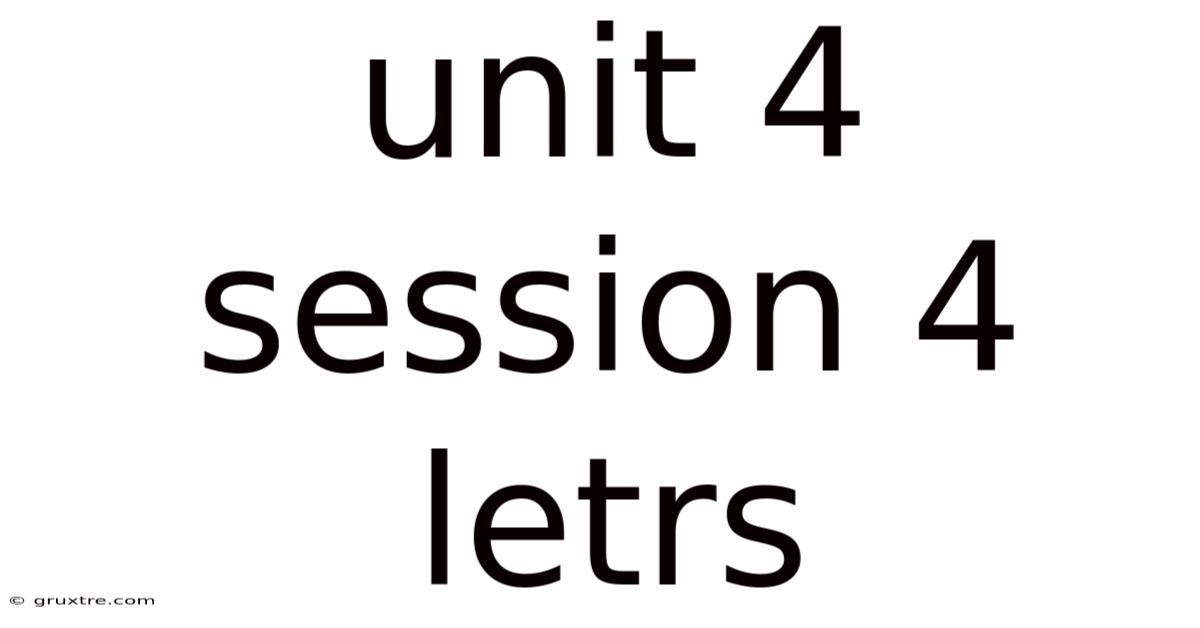Unit 4 Session 4 Letrs
gruxtre
Sep 13, 2025 · 4 min read

Table of Contents
I cannot find any established educational curriculum or standardized test referring to "Unit 4 Session 4 LETRS." LETRS (Language Essentials for Teachers of Reading and Spelling) is a widely used professional development program for educators, but it doesn't have a standardized unit and session numbering system universally applied across all implementations. The specific content of a "Unit 4 Session 4" would depend entirely on the specific LETRS curriculum version and how the training program is structured by the individual institution offering it.
Therefore, I cannot write a complete article detailing the contents of a hypothetical "Unit 4 Session 4 LETRS." To provide you with relevant information, I need more context:
- Which version of the LETRS program are you referring to? Different versions have different content.
- Where did you encounter this reference? Knowing the source (e.g., a course syllabus, a training document) will help identify the specific material covered.
However, I can provide a comprehensive overview of common topics covered within LETRS programs, which may overlap with the potential content of a hypothetical "Unit 4 Session 4." This overview will cover the fundamental aspects of reading instruction that LETRS emphasizes:
Understanding the Core Principles of LETRS and its Potential Content Areas
LETRS is built upon a strong foundation of scientific research in reading acquisition. The program's core principles typically address several key areas:
1. Phonemic Awareness: The Foundation of Reading
This crucial aspect of early literacy development focuses on the ability to hear and manipulate the individual sounds (phonemes) in spoken words. LETRS likely dedicates significant time to this, covering:
- Identifying and isolating phonemes: Activities like segmenting (breaking words into sounds) and blending (combining sounds to form words) are essential.
- Manipulating phonemes: Tasks such as deleting, adding, and substituting phonemes within words strengthen phonemic awareness.
- Rhyming and alliteration: These activities build awareness of sound patterns in language.
- The relationship between phonemes and graphemes: Understanding how sounds correspond to letters and letter combinations (graphemes) is vital for decoding.
A hypothetical "Unit 4 Session 4" might delve deeper into advanced phonemic awareness skills, perhaps focusing on multisyllabic words or complex consonant blends.
2. Phonics: Decoding and Encoding
Phonics instruction connects sounds (phonemes) to letters (graphemes). LETRS emphasizes systematic and explicit phonics instruction, teaching students to:
- Decode words: Sound out written words to read them accurately.
- Encode words: Spell words by translating sounds into letters.
- Understand phonics patterns and rules: Learn common letter-sound relationships, vowel patterns (short and long vowels, diphthongs), consonant digraphs and blends, and other orthographic patterns.
- Apply phonics knowledge to unfamiliar words: Use learned phonics skills to decode new and challenging words.
A potential "Unit 4 Session 4" might concentrate on advanced phonics concepts like vowel teams, r-controlled vowels, or less common spelling patterns.
3. Fluency: Reading with Speed, Accuracy, and Expression
Reading fluency is crucial for comprehension. LETRS likely addresses:
- Accuracy: Reading words correctly.
- Rate: Reading at an appropriate speed.
- Prosody: Reading with appropriate expression, intonation, and phrasing.
- Strategies for improving fluency: Repeated readings, choral reading, and partner reading are common techniques.
A "Unit 4 Session 4" might explore ways to assess fluency, differentiate instruction for struggling readers, or address fluency challenges related to specific text types.
4. Vocabulary: Building Word Knowledge
Vocabulary development is a continuous process. LETRS emphasizes:
- Direct instruction of vocabulary: Explicitly teaching new words and their meanings.
- Contextual vocabulary learning: Learning words through reading and exposure to rich language.
- Word-learning strategies: Using dictionaries, context clues, and morphemic analysis (breaking words into parts to understand their meaning) to learn new vocabulary.
A "Unit 4 Session 4" may focus on specific vocabulary acquisition strategies, advanced vocabulary instruction for older students, or the link between vocabulary and reading comprehension.
5. Reading Comprehension: Understanding Text
Reading comprehension is the ultimate goal. LETRS likely addresses various comprehension strategies, including:
- Making predictions: Anticipating what will happen in the text.
- Monitoring comprehension: Checking understanding while reading.
- Asking questions: Formulating questions to clarify understanding.
- Summarizing: Condensing the main points of a text.
- Making inferences: Drawing conclusions based on evidence in the text.
- Visualizing: Creating mental images based on the text.
A "Unit 4 Session 4" might focus on advanced comprehension skills, like analyzing text structure, author's purpose, or drawing comparisons across multiple texts.
6. Spelling: Applying Phonics and Morphology
Spelling is closely linked to reading. LETRS likely covers:
- Phonics-based spelling: Spelling words based on their sounds.
- Morphemic spelling: Spelling words based on their meaning units (morphemes).
- Spelling patterns and rules: Applying knowledge of common spelling patterns and rules.
- Strategies for improving spelling: Using word sorts, spelling tests, and other activities.
A "Unit 4 Session 4" could explore advanced spelling patterns, the relationship between morphology and spelling, or strategies for supporting struggling spellers.
This overview provides a general picture of the topics typically covered in LETRS. To get a precise outline of a specific "Unit 4 Session 4," you need to provide more details about the program version and its source. Once you provide this information, I can assist you further.
Latest Posts
Latest Posts
-
Fm 7 0 Board Questions
Sep 13, 2025
-
Photosynthesis And Cellular Respiration Review
Sep 13, 2025
-
Med Surg 2 Final Exam
Sep 13, 2025
-
3 2 1 Survey And Assess
Sep 13, 2025
-
Learn2serve Food Handlers Answers Texas
Sep 13, 2025
Related Post
Thank you for visiting our website which covers about Unit 4 Session 4 Letrs . We hope the information provided has been useful to you. Feel free to contact us if you have any questions or need further assistance. See you next time and don't miss to bookmark.